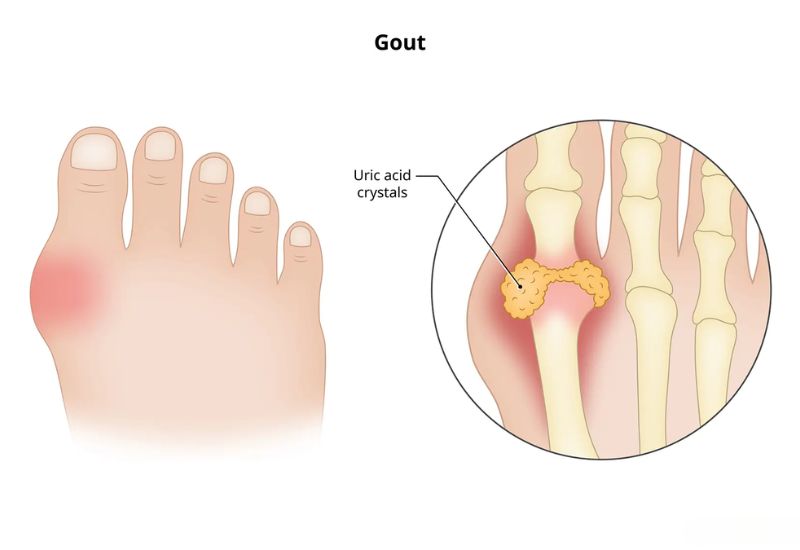Gout is a chronic condition related to an excess of uric acid in the blood. This disease causes significant pain and can lead to severe complications. Many people wonder if gout can be cured and what gout treatment options are available to manage it effectively. This article provides insights into these questions.
1. Can Gout be Cured?
1.1 What is Gout?
Gout is a common form of arthritis that occurs due to an excess of uric acid in the blood, leading to the formation of sharp, needle-like crystals in the joints. This condition typically causes sudden and intense pain in joints such as the toes, fingers, and knees, often accompanied by swelling and redness. The pain can be so severe that it hampers movement.
Usually, only one joint is affected, with the big toe being the most common. However, some individuals may experience pain in multiple joints, particularly at night.
Gout progresses through two main stages:
– Acute Gout: Characterized by the deposition of sharp urate crystals that irritate the joint lining, causing swelling, pain, and redness. Acute attacks often occur due to stress, consumption of high-protein foods, or excessive alcohol intake.
– Chronic Gout: In this stage, tophi (urate crystal deposits) form around the joints, kidneys, and other tissues.

Gout occurs when uric acid crystals accumulate, causing joint swelling and pain.
1.2 Can Gout be Cured?
Medical experts confirm that gout is a chronic condition, making it difficult to cure. However, with early detection and strict adherence to a treatment plan, the disease can be managed effectively, allowing individuals to maintain a good quality of life.
1.3 Treatment Goals for Gout
Since gout cannot be cured, current treatments focus on reducing symptoms and preventing future flare-ups. Treatment objectives vary based on the stage of gout:
– Acute Stage: Pain relievers and anti-inflammatory medications are prescribed to reduce joint swelling and pain. Afterward, maintaining controlled uric acid levels in the blood is crucial to prevent recurrence.
– Chronic Stage: The goal is to maintain uric acid levels below 360 μmol/L (60 mg/L) for those without tophi and below 320 μmol/L (50 mg/L) for those with tophi. Continuous, long-term treatment is essential.
2. Gout Treatment Methods
Treatment strategies for gout depend on individual cases and often involve a combination of the following approaches:
2.1 Dietary Adjustments
A balanced diet and healthy lifestyle are crucial for managing gout at home. Patients should avoid foods high in purines, such as red meat, organ meats, fish, and shellfish. Instead, they should eat plenty of fruits, vegetables, and eggs, with meat consumption limited to 150 grams per day. Alcohol and sugary drinks should be avoided, and regular exercise and adequate water intake are encouraged.

While gout is incurable, a proper diet can help manage the condition.
2.2 Medications – One of Gout Treatment Methods
Common medications prescribed for gout include:
Pain Relievers and Anti-Inflammatories: Colchicine is used for pain relief and inflammation control during acute gout attacks, with a recommended dose of 1 mg/day, ideally taken within the first 12 hours of an attack. Nonsteroidal anti-inflammatory drugs (NSAIDs) may also be used if there are no contraindications.
Uric Acid-Lowering Medications: Allopurinol is often prescribed to lower blood uric acid levels but can cause side effects such as nausea, fever, headaches, and allergic reactions. Genetic testing is recommended to rule out the risk of allergy before using Allopurinol. Alternatives like Probenecid and Lesinurad can also help reduce uric acid levels through the kidneys, though they should be used cautiously in patients with kidney stones.
Given the potential side effects of gout medications, patients should strictly follow their doctor’s prescriptions to minimize risks.
2.3 Herbal Remedies – One of Gout Treatment Methods
Certain herbs, such as water plantain, phellodendron, and noni fruit, can aid in gout treatment by promoting uric acid excretion, preventing urate crystal deposition, and reducing joint pain and swelling. These herbs are used in traditional medicine and modern practices to alleviate gout symptoms and lower uric acid levels.
3. Preventing Gout Recurrence
To prevent gout or its recurrence, consider the following measures:
– Regular health check-ups for early detection and timely treatment
– Adherence to prescribed treatment regimens, avoiding self-adjustment of dosages
– Daily exercise to boost metabolism and maintain a healthy weight
– A scientific diet limiting red meat, seafood, and organ meats

Prevent gout recurrence by scheduling regular check-ups.
Understanding gout and gout treatmnet can help individuals live comfortably despite the disease. While gout cannot be completely cured, it can be controlled with proper treatment and lifestyle adjustments. If you notice gout symptoms, seek medical advice promptly for accurate diagnosis and appropriate treatment.








